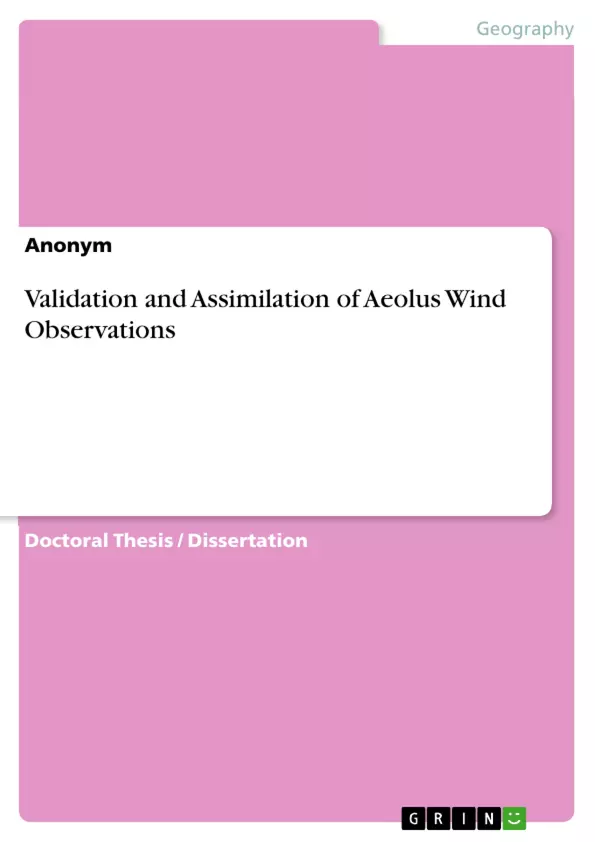
Validation and Assimilation of Aeolus Wind Observations
Doktorarbeit / Dissertation, 2023
118 Seiten, Note: 1
Geowissenschaften / Geographie - Meteorologie, Aeronomie, Klimatologie
Leseprobe
Inhaltsverzeichnis (Table of Contents)
- Chapter 1: Introduction
- 1.1 State of the art
- 1.1.1 Importance of atmospheric wind observations for NWP
- 1.1.2 Deficiencies in the global observing system
- 1.1.3 Wind profile observations from space - historical scientific and technological background
- 1.1.4 Aeolus mission objectives
- 1.2 Research goals and outline of the thesis
- Chapter 2: Basic principles
- 2.1 Aeolus observations
- 2.1.1 DWL ALADIN measurement concept
- 2.1.2 Level-2B wind processing
- 2.1.3 Overview: Satellite orbit and measurement geometry
- 2.1.4 Main changes in the Aeolus L2B data set during the mission
- 2.2 Data assimilation
- 2.2.1 Three-dimensional variational assimilation
- 2.2.2 Ensemble Kalman Filter
- 2.2.3 Global data assimilation system at DWD
- 2.2.4 Observation error components in data assimilation
- Chapter 3: Data and methodology
- 3.1 Data sets and methods for the Aeolus HLOS wind validation study
- 3.1.1 Evaluation period and region
- 3.1.2 Collocated radiosonde observations
- 3.1.3 DWD ICON and ECMWF IFS model equivalents
- 3.1.4 Quality control criteria for the Aeolus HLOS wind observations
- 3.1.5 Representativeness errors
- 3.1.6 Statistical metrics
- 3.2 Data sets and methods to assess the impact of Aeolus HLOS wind assimilation
- 3.2.1 Experimental set up
- 3.2.2 Verification data and methods
- Chapter 4: Results: Validation of Aeolus HLOS wind observations
- Chapter 5: Results: Impact of Aeolus HLOS wind assimilation in the global model ICON
Zielsetzung und Themenschwerpunkte (Objectives and Key Themes)
This thesis aims to contribute to the optimal use of Aeolus wind observations in Numerical Weather Prediction (NWP) models and evaluate their benefits using the ICON model's global data assimilation system at the Deutscher Wetterdienst (DWD). The research addresses the characteristics of Aeolus wind observation errors, methods for error correction, the relative benefit of Aeolus observations within the DWD assimilation system, and dynamical scenarios linked to Aeolus's high impact on NWP forecasts.
- Validation of Aeolus HLOS wind profile observations.
- Assessment of systematic and random errors in Aeolus wind observations.
- Evaluation of bias correction methods for Aeolus data.
- Analysis of Aeolus observation impact on the ICON global assimilation system.
- Identification of dynamical scenarios driving Aeolus's impact on NWP forecasts.
Zusammenfassung der Kapitel (Chapter Summaries)
Chapter 1: Introduction Provides background on the importance of wind observations for NWP, highlighting deficiencies in the global observing system and the Aeolus mission's objectives. It outlines the research goals and the structure of the thesis.
Chapter 2: Basic principles Explains the fundamentals of Aeolus observations, including the ALADIN instrument and data processing. It also details relevant data assimilation methods, focusing on 3D-Var and EnKF/LETKF, and describes the DWD global data assimilation system.
Chapter 3: Data and methodology Describes the datasets used for the Aeolus HLOS wind validation study (radiosondes, ICON, and IFS model equivalents) and the impact study (OSE). It details the quality control procedures, representativeness error estimation, and statistical metrics employed.
Chapter 4: Results: Validation of Aeolus HLOS wind observations Presents the validation results, characterizing the systematic and random errors of Aeolus HLOS wind observations and investigating bias dependencies. It explores bias correction approaches.
Schlüsselwörter (Keywords)
Aeolus, Doppler Wind Lidar (DWL), Numerical Weather Prediction (NWP), data assimilation, 3D-Var, Ensemble Kalman Filter (EnKF), observation error, representativeness error, bias correction, Observing System Experiment (OSE), ICON model, ECMWF IFS model, Quasi-Biennial Oscillation (QBO), El Niño-Southern Oscillation (ENSO), extratropical transition (ET).
Frequently Asked Questions: Aeolus Wind Observations
What is the European Space Agency’s Aeolus mission?
Aeolus is a satellite mission equipped with a Doppler Wind Lidar (DWL) called ALADIN, designed to provide quasi-global profiles of Earth's winds to improve weather forecasting.
How does Doppler Wind Lidar (DWL) work?
DWL measures the Doppler shift of laser light backscattered from molecules (Rayleigh) and particles (Mie) in the atmosphere to determine wind speed and direction.
What is "Data Assimilation" in Numerical Weather Prediction?
Data assimilation is the process of combining short-range forecasts with new atmospheric observations (like Aeolus data) to create the most accurate initial conditions for a new forecast.
Why are global wind profile observations important?
There is a lack of wind data in many regions (like oceans and tropics). Filling these gaps is crucial for improving the skill of global numerical weather models like ICON or IFS.
What are "representativeness errors"?
These are errors that occur when comparing satellite measurements (covering a large volume) with local point observations (like radiosondes) due to differences in spatial and temporal scales.
Details
- Titel
- Validation and Assimilation of Aeolus Wind Observations
- Hochschule
- Ludwig-Maximilians-Universität München (Physics)
- Note
- 1
- Autor
- Anonym (Autor:in)
- Erscheinungsjahr
- 2023
- Seiten
- 118
- Katalognummer
- V1391403
- ISBN (Buch)
- 9783346941671
- Sprache
- Englisch
- Schlagworte
- Satellite Numerical Weather Predicion Lidar Observations Wind Data Assimilation
- Produktsicherheit
- GRIN Publishing GmbH
- Preis (Ebook)
- US$ 38,99
- Arbeit zitieren
- Anonym (Autor:in), 2023, Validation and Assimilation of Aeolus Wind Observations, München, Page::Imprint:: GRINVerlagOHG, https://www.diplomarbeiten24.de/document/1391403
- Autor werden
- Ihre Optionen
- Vertriebskanäle
- Premium Services
- Autorenprofil
- Textarten und Formate
- Services für Verlage, Hochschulen, Unternehmen

- © GRIN Publishing GmbH.
- Alle Inhalte urheberrechtlich geschützt. Kopieren und verbreiten untersagt.
- info@grin.com
- AGB
- Open Publishing
Der GRIN Verlag hat sich seit 1998 auf die Veröffentlichung akademischer eBooks und Bücher spezialisiert. Der GRIN Verlag steht damit als erstes Unternehmen für User Generated Quality Content. Die Verlagsseiten GRIN.com, Hausarbeiten.de und Diplomarbeiten24 bieten für Hochschullehrer, Absolventen und Studenten die ideale Plattform, wissenschaftliche Texte wie Hausarbeiten, Referate, Bachelorarbeiten, Masterarbeiten, Diplomarbeiten, Dissertationen und wissenschaftliche Aufsätze einem breiten Publikum zu präsentieren.
Kostenfreie Veröffentlichung: Hausarbeit, Bachelorarbeit, Diplomarbeit, Dissertation, Masterarbeit, Interpretation oder Referat jetzt veröffentlichen!
- GRIN Verlag GmbH
-
- Nymphenburger Str. 86
- 80636
- Munich, Deutschland
- +49 89-550559-0
- +49 89-550559-10
- info@grin.com
-









